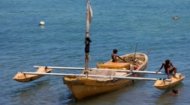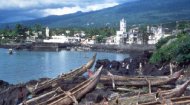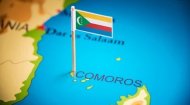|
Comoros Profile |
Comoros Profile |
Comoros Profile | Comoros Profile |
|
|

 According to ISS African Futures, Comoros continues to face challenges related to governance, corruption, and social unrest. There are also concerns about human trafficking, drug trafficking, and financial crimes, which are linked to the country's instability and corruption. Despite the challenges, there have been attempts to establish stability through power-sharing agreements and democratic elections. The 2000 Fomboni Accords, for example, established a rotating presidency among the three islands. According to The World Bank, about 37.2% of the total population falls below the poverty line and almost half of the population of Comoros are children under the age of 15 with a life expectancy of 65.40 years (2025). In Comoros, primary school enrollment is relatively high, with a gross enrollment rate of 99% for both girls and boys combined, however, this rate drops to 62% at the lower secondary level. Access to safe and reliable water in the Comoros is a significant challenge, with only 15% of the population having access to a safe and reliable water source, according to government estimates. This situation is exacerbated by factors like the country's geography, land degradation, and climate change. The lack of safe water contributes to public health crises, including a recent cholera outbreak that has claimed many lives. Whilst some of these difficulties are man-made through poor hygiene practices compounded by a lack of adequate sanitation, one of the world's most active volcanoes, Mount Karthala, regularly erupts with toxic ash entering the water supply chain. The video explores what should have been an island paradise for tourists rather than a conflict zone, although recent settlements have provided some stability. The HDI (Human Development Index) is measured by the UNESCO Institute for Statistics (UIS) and the World Bank and is based upon the life expectancy, literacy, access to knowledge and living standards of a country. Comoros is in 152nd place out of 193 countries and territories in 2025. That's a rise though still low but above neighbouring Madagascar at 183rd place and Tanzania in 165th place. |








